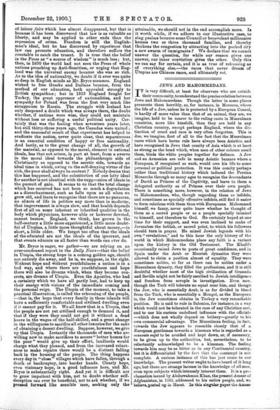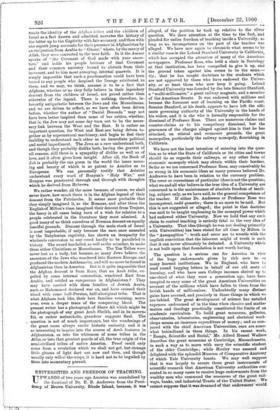JEWS AND MAHOMMEDANS.
IT is very difficult, at least for observers who are outside their community, to understand the precise relation between Jews and Mahommedans. Though the latter in some places persecute them horribly, as, for instance, in Morocco, where the life of a Jew, unless he is protected by a European Consul, is hardly of more value than that of an animal, they are, we imagine, held to be nearer to the ruling caste in Mussulman countries, more like kinsfolk, than they are held in any Christian country, except perhaps England, where the dis- tinction of creed and race is very often forgotten. This is due, we imagine, first of all to the fact that the Mussulman races which have borne rule have always been Asiatics, and have recognised in Jews that comity of Asia which is at least as strong as the bond which, when men of other colours assail them, binds the white peoples together for defence. A Jew and an Armenian are safe in many Asiatic bazaars where a European, if recognised as such, would owe his life to some personal or political protection. It was this comity perhaps rather than traditional history which induced the Persian Monarchs through so many ages to recognise the descendants of David as Princes of the Captivity, and leave to them a delegated authority as of Princes over their own people. There is something more, however, in the relation of Jews to Mahommedans, who, though regarding them as infidels, and sometimes as specially offensive infidels, still find it easier to form relations with them than with Europeans. Mahommed himself, we fancy, never quite knew whether he thought of them as a sacred people or as a people specially inimical to himself, and therefore to God. He certainly hoped at one time for their support, and was even inclined to make of Jerusalem the keblah, or sacred point, to which his followers should turn in prayer. He mixed Jewish legends with his own " revelations," and to this hour the only history of the world in which Mahommedans place any faith is a variant upon the history in the Old Testament. The Khalifs occasionally raised Jews to posts of great confidence, and in Spain under the Arab or Moorish dynasties they were allowed to claim a position almost of equality. They were sometimes nobles, so far as there can be nobles under a Mussulman dynasty, they filled the professions, and it is still doubtful whether most of the high civilisation of Granada and Seville might not be fairly ascribed to Jewish intelligence and freedom from scruple in investigation. Even now, though the Turk will tolerate no equal near him, and though the Jew, who is essentially Arab, is as far divided in blood from the Turk, who is essentially a Mongol, as the European is, the Jew sometimes obtains in Turkey a very remarkable position. He is said to rule in Salonica, for instance, in a way which would not be tolerated in the case of any Christian sect, and to use his curious undefined influence with the officials —which does not wholly depend on bribery—greatly to his own commercial advantage. The Mussulman feeling, in fact, towards the Jew appears to resemble closely that of a European gentleman towards a kinsman who is regarded as a mauvais rujet to be avoided and kept down, or, if necessary, to be given up to the authorities, but, nevertheless, to be reluctantly acknowledged to be a kinsman. The feeling towards him may be as bitter as in any Continental country, but it is differentiated by the fact that the contempt is not complete. A curious instance of this has just come to our knowledge. The present writer ought to have heard of it long ago, but there are strange lacunae in the knowledge of all men, even upon subjects which intensely interest them. It is a pro- clamation issued by Abdurrahman Khan, the present Ameer of Afghanistan, in 1882, addressed to his entire people, and, we believe, posted up in Herat. In this singular paper the Ameer treats the identity of the Afghan tribes and the children of Israel as a fact known and admitted, narrates the history of the latter up to the Captivity with fair accuracy, and then with one superb jump accounts for their presence in Afghanistan by an emigration from Arabia to " Ghour," where, by the mercy of Allah, they were converted to the true faith. In it the Ameer speaks of " the Covenant of God made with your ances- tors," and holds his people because of that Covenant and their common ancestry bound to abstain from their incessant, and to him most annoying, internal quarrels. It is simply impossible that such a proclamation could have been issued to any people who despised the lineage attributed to them, and we may, we think, assume it to be a fact that Afghans, whether or no they fully believe in their legendary descent from the children of Israel, are proud rather than otherwise of the legend. There is nothing, therefore, in- herently antipathetic between the Jews and the Mussulmans, and we are driven to reflect, as we have often been driven before, whether the author of " Daniel Deronda " may not have been better inspired than some of her critics, whether, that is, the Jew may not some day turn out to be the neces- sary link between the West and the East. It is rather an important question, for West and East are being driven to- gether as by supernatural machinery, and begin to feel their
inability to understand each other as an immediate political and social impediment. The Jews as a race understand both, and though they probably dislike both, having the gravest of all reasons, still there is a sympathy of dislike as well as of love, and it often gives keen insight. After all, the Book of Job is probably the one poem in the world the inner mean- ing and beauty of which is as patent to Asiatics as to Europeans. We can personally testify that Asiatics understand every word of Bunyan's " Holy War," and Bunyan was penetrated through and through with thoughts which he derived from Hebrews.
We rather wonder, all the more because, of course, we shall never know, how much there is in the Afghan legend of their descent from the Patriarchs. It seems most probable that they simply imagined it, as the Romans, and after them the English of Milton's time, imagined their descent from Trojans, the fancy in all cases being born of a wish for relation to a people celebrated in the literature they most admired. A good many of us think ourselves of Norman descent on equally fanciful grounds. Descent through the main stock of • Israel is most improbable, if only because the race, once annealed by the Babylonian captivity, has shown an incapacity for wholesale conversion to any creed hardly to be paralleled in history. The sword has failed, as well as the scimitar, to make them either Christians or Mussulmans. The Ten Tribes were never lost as a body, but became, as many Jews believe, the ancestors of the Jews who wandered into Eastern Europe, and produced the modern Ashkenazim, and will no more be found in Afghanistan than in America. But is it quite impossible that the Afghan descent is from Esau, that an Arab tribe, ex- pelled by some internal commotion, wandered East from Arabia, and settled as conquerors in Afghanistan ? They may have carried with them families of Jewish Arabs, such as Mahommed declared war on, and have crossed their blood with some half-Persian, half-aboriginal tribe. That is what Afghans look like, their best families retaining, more- over, even a deeper trace of the conquering blood. The present writer has a photograph of Shere Ali which might be the photograph of any great Arab Sheikh, and in its mourn. ful, or rather melancholic, grandeur suggests Saul. The question is not of much importance, but the wanderings of the great races always excite historic curiosity, and it is as interesting to inquire into the source of Arab features in Afghanistan, as into the whiteness of some tribes in the Atlas, or into that greatest puzzle of all,the true origin of the semi-civilised tribes of native America. Proof could only come from a revelation which we shall not get, but strange little gleams of light dart out now and then, and though usually only will-o'-the-wisps, it is hard not to be beguiled by them into momentary pursuit.







































 Previous page
Previous page